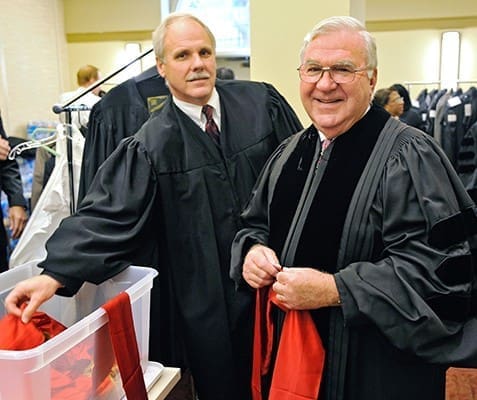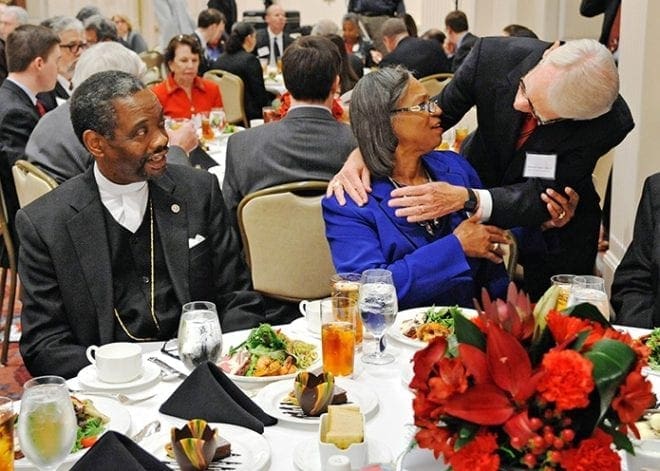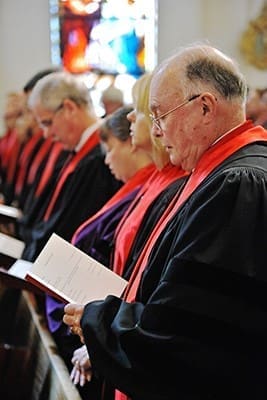 Photo By Lee Depkin
Photo By Lee DepkinAtlanta
Charleston leaders honored by St. Thomas More Society
By ANDREW NELSON, Staff Writer | Published October 15, 2015
ATLANTA—Judges, magistrates and attorneys were encouraged to “serve the common good” as the Atlanta legal community gathered for the annual Red Mass.

Georgia Supreme Court Presiding Justice P. Harris Hines prepares to don the red stole, worn by all the jurists at the annual Red Mass. Justice Hines was honored as the recipient of the St. Thomas More Award for his commitment to justice for our youth. Archbishop Wilton D. Gregory celebrated the Red Mass, invoking God’s blessings upon those entrusted with the administration of justice. Photo By Lee Depkin
Dressed in black judicial robes and red stoles, members of the Supreme Court of Georgia and other Atlanta area judges filled rows of the historic Basilica of the Sacred Heart of Jesus on Thursday, Oct. 8, to the music of the Atlanta Brass Society and the St. Thomas More Schola.
The prayers are to “strengthen our common home within the Georgia community with a sense of security and well-being throughout this new judicial term,” said Archbishop Wilton D. Gregory.
The Red Mass traditionally occurs at the start of the judicial year. It dates back 750 years in Europe when church leaders in the thirteenth century prayed for the Holy Spirit to bestow wisdom on those who worked in the legal system and the courts. The tradition began in the United States in 1928. Its name comes from the color of vestments worn by the clergy signifying the fire of the Holy Spirit.
The St. Thomas More Society of Atlanta, the Catholic law organization, awarded three honors at a luncheon following the prayers for the judiciary.
The first St. Francis of Assisi Award was given to the Rev. Dr. Norvel Goff Sr., an elder and interim pastor of Emanuel African Methodist Episcopal Church, Charleston, South Carolina, where nine people were fatally shot during a Bible study in June.
The shootings are proof evil is in the world, Goff said, but not the last word.
“Our faith is stronger than fear. And love always overwhelms hate. Remember that God loves each and every one of us. We are called to be our better selves.”

At the awards luncheon, Charleston, S.C., Mayor Joseph Riley embraces Marie Goff, wife of the Rev. Dr. Norvel Goff Sr., interim pastor of Emanuel A.M.E. Church in Charleston. Photo By Lee Depkin
Goff said he accepted the honor in the name of the church members for the recognition of “love and thanksgiving”: the love of God and thanksgiving for the affection people from around the world have shown the congregation.
Those killed, 26 to 87 years old, were Emanuel’s senior pastor and state senator, the Rev. Clementa Pinckney; a retired pastor, the Rev. Daniel Simmons; ministers Rev. DePayne Middleton-Doctor and Rev. Sharonda Coleman-Singleton; sexton Ethel Lance; Bible study leader Myra Thompson; and church members Tywanza Sanders, Cynthia Hurd and Susie Jackson.
Atlanta Bar Association President Harold Franklin, a King & Spalding partner, presented the honor, the first given by the society to a non-lawyer. Franklin said the minister lived the prayer of St. Francis: “Where there is hatred, let me sow love. Where there is injury, pardon.”
Earlier at the basilica, Archbishop Gregory led the celebration, which included five priests and deacons assisting at the altar.
During his homily, the archbishop reminded the judges how petitioners will come to them some seeking mercy and others seeking financial relief. “People will come to you, whatever the hour, seeking justice, mercy, wisdom, but perhaps most importantly, they will come to you with hope,” he said.

Judges, in their black robes adorned with red stoles, were prominently placed in the front pews for the annual Red Mass at the Basilica of the Sacred Heart of Jesus. Photo By Lee Depkin
Providing justice requires “patience, prudence, impartiality, integrity, and mercy,” he said. He remarked the guests honored by the St. Thomas More Society have shown those gifts. Charleston Mayor Joseph Riley Jr. and Goff both led their communities when their pain was real and deeply personal, he said.
“Yet their faith and generosity of spirit have inspired people throughout our nation and world. They have given public witness to mercy and the importance of community at a moment in time when most of us would have perhaps found those virtues impossible to exhibit.”
The mayor and the minister together visited with the families of the “nine precious, prayerful souls” slain at the Bible study. Riley choked up with emotion when he spoke of the event’s aftermath. That night he heard the “the moans, the cries, the anguish, the natural cries of human grief” from the families. He said he told the Charleston community, “We would respond to this act of hate with love. We would hug each other. We would pray for each other. We would love each other. And we did.”
Riley, who has led the city since 1975, has plans for a $75 million museum of African-American history on Gadsden’s Wharf where ships unloaded enslaved Africans. The proposed location for the museum is near the church, known as Mother Emanuel, whose history from its formation in 1791 for free blacks and slaves is fraught with the suffering and struggle for racial harmony.
The group presented St. Thomas More Awards to Riley, a lawyer before his first campaign for mayor, and to Georgia Supreme Court Presiding Justice P. Harris Hines. Hines was honored for his “servant leadership” with the court’s Committee on Justice for Children.